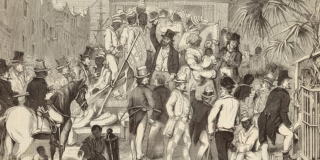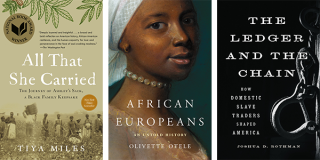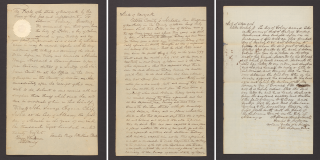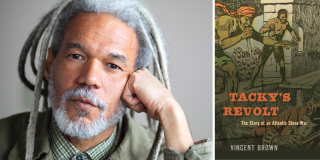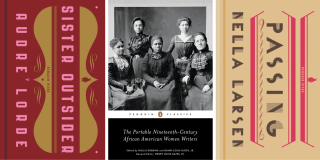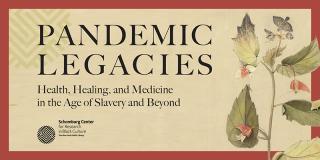Lapidus Center Announces 2023 Harriet Tubman Prize Winners
The Lapidus Center for the Historical Analysis of Transatlantic Slavery at the Schomburg Center is pleased to announce that Kerri K. Greenidge and Jori Lewis are the winners of its 2023 Harriet Tubman Prize for their books The Grimkes: The Legacy of Slavery in an American Family and Slaves for Peanuts: A Story of Conquest, Liberation, and a Crop That Changed History, respectively.
2024 Harriet Tubman Prize Submissions
The submission dates for the 2024 Harriet Tubman Prize have not been announced. Please continue to check our location page and Lapidus Center page for updates.

2024-2025 Lapidus Center Fellowships
The application dates for the 2024-2025 class of Lapidus Center fellows have not been announced. Please continue to check our location page and Lapidus Center page for updates.

Lapidus Center Announces 2023 Harriet Tubman Prize Finalists
Congratulations to Kerri K. Greenidge, R. Isabela Morales, Jesse Olsavsky, and Jori Lewis. Their books: The Grimkes: The Legacy of Slavery in an American Family; Happy Dreams of Liberty: An American Family in Slavery and Freedom; The Most Absolute Abolition: Runaways, Vigilance Committees, and the Rise of Revolutionary Abolitionism, 1835–1861, and Slaves for Peanuts: A Story of Conquest, Liberation, and a Crop That Changed History, respectively, are finalists for the 2023 Harriet Tubman Prize.
Meet the 2022-2023 Cohort of Lapidus Center Fellows
The Lapidus Center offers long- and short-term fellowships to researchers who receive access to the Center's collections, opportunities to disseminate their work across Library channels, and monetary support.
Meet the 2022–2023 cohort of fellows.
Dr. Tiya Miles Wins Schomburg Center’s 2022 Harriet Tubman Prize
The Lapidus Center for the Historical Analysis of Transatlantic Slavery at the Schomburg Center is pleased to announce that Dr. Tiya Miles is the winner of its 2022 Harriet Tubman Prize for her book All That She Carried: The Journey of Ashley's Sack, a Black Family Keepsake.
Lapidus Center Announces 2022 Harriet Tubman Prize Finalists
Professors Tiya Miles (Harvard University), Olivette Otele (University of Bristol), and Joshua D. Rothman (University of Alabama) have all been named as finalists for the 2022 Harriet Tubman Prize granted by the Center’s Lapidus Center for the Historical Analysis of Transatlantic Slavery. The prize honors the best nonfiction book on the slave trade, slavery, and anti-slavery in the Atlantic World published in the U.S. during the previous year. The winner will be announced in December.
1-Day Display: Sojourner Truth & her 1828 Court Records to Emancipate Her Son
On October 4 starting at 2 PM, experience a rare opportunity to view the court records of Sojourner Truth's historic 1828 legal victory to free her son from enslavement in our one-day pop-up exhibit. Plus, view a copy of Narrative of Sojourner Truth: A Northern Slave, Emancipated from Bodily Servitude by the State of New York, in 1828 by Sojourner Truth and Olive Gilbert from the collection of our founder Arturo Schomburg. The text offers Truth's personal account of the case. The pop-up exhibit is in support of the our program, Uncovered: Sojourner Truth's Quest for Liberty and Justice, taking place at the Schomburg Center on the same day at 6:30 PM.
This panel discussion is in collaboration with the Historical Society of the New York Courts, the New York State Archives, and the New York State Unified Court System. (Court papers: New York State Archives. New York (State). Supreme Court of Judicature (Utica). Writs of Habeas Corpus, 1807-1832. J0029-82. Box 3)
Lapidus Center Announces 2022–2023 Fellows
Congratulations to Edward Ball (Independent Scholar and Historian), Arielle X. Alterwaite (Ph.D. Candidate in the Department of History, University of Pennsylvania), and Dr. David Luis-Brown (Associate Professor of Cultural Studies and English, Claremont Graduate University). Using the Schomburg Center’s extensive collections, each will examine slavery across the Atlantic world.
Dr. Vincent Brown Wins the Harriet Tubman Prize
The Lapidus Center for the Historical Analysis of Transatlantic Slavery at the Schomburg Center for Research in Black Culture is pleased to announce that Dr. Vincent Brown is the winner of the 2021 Harriet Tubman Prize for his book Tacky’s Revolt: The Story of an Atlantic Slave War. The Harriet Tubman Prize awards $7,500 to the best nonfiction book published in the United States on the slave trade, slavery, and anti-slavery in the Atlantic World.
Dr. Brown is the Charles Warren Professor of American History and Professor of African and African American Studies at Harvard University.
(Photo of Dr. Vincent Brown by Stephanie Mitchell)
About the Lapidus Center for the Historical Analysis of Transatlantic Slavery
The 2014 gift which created the Lapidus Center for the Historical Analysis of Transatlantic Slavery at the Schomburg Center included the generous financial investment as well as 400 rare items of printed material — and books and documents continue to be added to the collection. Today, the collection include over 700 items, making the Schomburg Center home to one of the world’s premier collections of slavery material.
The Center supports the work of researchers with long-term and short-term fellowships. Given the centrality of Atlantic slavery to the making of the modern world, the Lapidus fellowships ensure that slavery studies are a cornerstone of the Schomburg Center’s broader research community and provide a counterbalance to the contemporary direction of scholarship in African American and African Diaspora studies.
To raise awareness and historical literacy, the Lapidus Center engages the public with a variety of programs, an annual nonfiction prize, exhibitions, conferences, and partnerships with local, national, and international institutions.
-
Recommended Reads: Exploring Slavery & Memory in the U.S.
Learn MoreDiscover classic and contemporary novels, poetry, and nonfiction works curated by the Lapidus Center and Penguin Classics on slavery and memory in the U.S.
-
New Books from Lapidus Center Curator Dr. Michelle Commander
Learn MoreDr. Michelle D. Commander, associate director and curator of the Lapidus Center, has published two new books including Unsung: Unheralded Narratives of American Slavery & Abolition and Avidly Reads: Passages.
-
Subversion & The Art of Slavery Abolition
Learn MoreThis exhibition highlights several of the ways that abolitionists engaged with the arts to agitate for enslaved people’s liberty in the eighteenth and nineteenth centuries.
-
Watch Now: Pandemic Legacies
Learn MoreThe virtual 2021 Lapidus Center conference explored medicine in the age of Atlantic slavery via a combination of keynote conversations and panel sessions. Explore videos of the conference and find out more about Black wellness.
Schomburg Center for Research in Black Culture
Founded in 1925 and named a National Historic Landmark in 2017, the Schomburg Center for Research in Black Culture is one of the world’s leading cultural institutions devoted to the research, preservation, and exhibition of materials focused on African American, African Diaspora, and African experiences.

